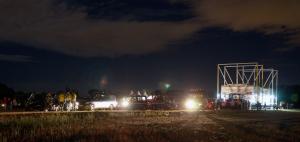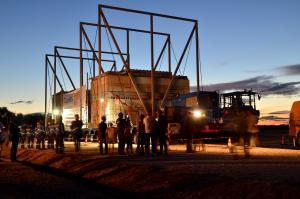The passage of an exceptional convoy is a common sight for the inhabitants of the villages of Berre, Rognac, La Fare-les-Oliviers or Lambesc. The area, close to the harbour in Marseille, is heavily industrialized: steelworks, refineries, the aircraft industry ... all depend on the delivery and expedition of large-size loads that travel the roads to the general indifference of the local population.
It takes something really exceptional to pull people out of their homes, old and young alike, and bring them to the roadside to ogle and gawk.
On Monday night, 16 September, the 352-wheel, 800-tonne trailer mimicking an actual ITER convoy did just that. As it commenced its four-night journey between Berre and the ITER site in Saint Paul-lez-Durance, hundreds of people were lined up along the roads, some of them in nightshirts and pyjamas, to watch the long procession of men and vehicles slowly advance along the first stage of the 104-kilometre ITER Itinerary.
The event, which aims to monitor the behaviour of roads and bridges under the extreme ITER loads, was the culmination of five years of hard work and complex calculations by the French public roads administration and the technical services of the Bouches-du-Rhône département. As ITER Deputy Director-General Rem Haange explained prior to the departure of the convoy, "The ITER Itinerary is essential to the project. It is the indispensable link between component fabrication in the factories of the ITER Members and the assembly of the machine by the ITER Organization."
It was around 10:00 p.m. when the convoy, organized by logistics service provider
DAHER, left its parking area in Berre. Night had fallen one hour earlier and the headlights of the trailer, accompanying vehicles and gendarmerie motorcycles contributed to the eerie atmosphere—the monster had awakened and was ready to take to the road.



